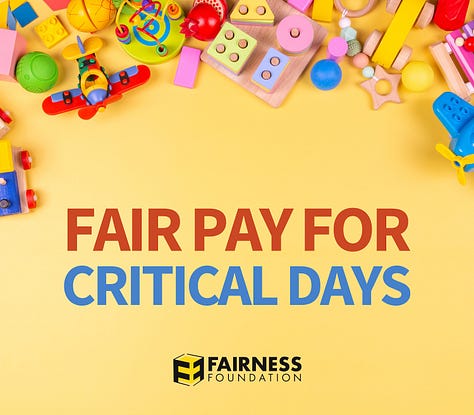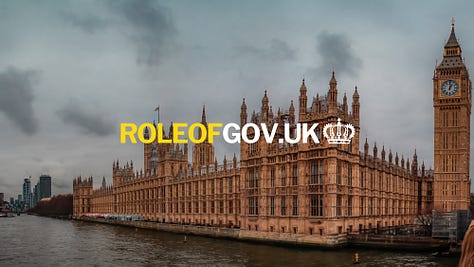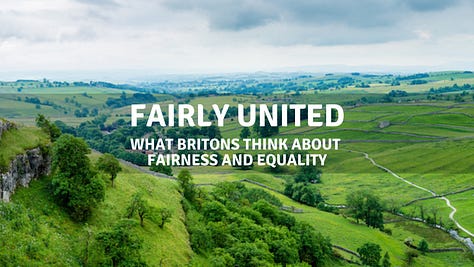Reviewing 2023 and previewing 2024
We look back on a year of investigating public attitudes to fairness, and forward to a year of making the political and economic case for a fairer society









Reflecting on our aims and activities
Inequality in the UK is returning to levels last seen during Edwardian times. Rising child poverty is causing spikes in under-five mortality, while the richest 50 families have more wealth than the poorest half of the population, and derive much of it from speculation and from extracting rather than creating wealth.
It’s a time of crisis, but also of opportunity, because almost everyone now recognises that inequality has gone too far. 85% of the British public are concerned about inequality, and even those who are less worried about inequality in principle are concerned about its practical consequences. These include constraining productivity and economic growth, threatening social cohesion and democracy, and undermining a rapid transition to net zero. And fairness provides us with a language and a set of concepts that can build on this emerging consensus.
So some of the traditional barriers to change are starting to crumble. Belief in the small state is now a minority sport, despite the best efforts of the short-lived Truss government and of sections of the British media. Active opposition to tackling inequality has diminished, but there is still plenty of passive opposition, supercharged by the limited capacity of politics and of the national conversation in Britain to focus on what really matters.
Our mission is to identify and attack some of these remaining, more passive barriers to tackling inequality. I see us as focusing on two barriers in particular:
Correcting the misperception that the public are less concerned about inequality, less supportive of action by government to tackle it, and more divided in their views about inequality than they actually are
Challenging the idea that inequality might be morally wrong but isn’t a first-order concern, by promoting evidence of the various ways in which different forms of inequality not only reinforce each other, but also stand in the way of achieving a broad set of political and public priorities, such as (sustainable) growth
In a sense, we are trying to make the political and the economic case for fairness, although the starting point must be defining what we mean by fairness and making the moral case. We aim to change both policies and narratives.
On the political side, we’ve begun a programme of attitudinal research, starting with opinion polls, to dig into public attitudes and to help us to demonstrate that there is a strong public consensus for change.
On the economic side, we’re exploring opportunities to champion, catalyse and communicate the evidence base – with a particular focus on practical policy solutions – to politicians and other decision-makers and influencers.
We’re increasingly thinking of ourselves as a thematically broad, inequality-focused organisation that operates in the space between politics, academia, government, think tanks and campaigners, making an evidence-based case to key audiences that combines moral authority and political impartiality with economic credibility, and also with an understanding of where the public are now and where they could be moved to in the future.
Activities this year and plans for next year
In 2023, we:
Commissioned a poll and published a report on public attitudes to strikes in February (Striking A Nerve)
Commissioned a poll and published a report on public attitudes to early years pay in March (Fair Pay for Critical Days)
Commissioned a poll and published a report on public attitudes to the role of the state in March (roleofgov.uk)
Commissioned a poll and published a report on public attitudes to wealth inequality in May (National Wealth Surplus), with follow-up analysis of 2019 Conservative voters (Three Tory Tribes)
Co-organised a conference in parliament on inequalities with the APPG on Inclusive Growth and the Policy Institute in July (Towards the Manifestos)
Co-published polling on attitudes to inequalities with Ipsos in July (Fairly United)
Published a report analysing how UK politicians talk about fairness over the last 25 years in October (Fairness In The House)
Commissioned a poll and published a report on public attitudes to health inequalities in November (Socially Determined)
Organised a series of virtual events on fairness with the Policy Institute at King’s College London, with Kate Pickett and Richard Wilkinson, Mark Carney, Daniel Chandler and a group of business leaders and MPs (as well as physical events at the Conservative Party Conference and the Labour Party Conference)
I was delighted to be elected a Fellow of the Academy of Social Sciences in October.
In 2024, we want to carry out more attitudinal research, including through polling but also through qualitative research with partners, possibly including deliberative research. Topics include:
Attitudes to the role of luck in life (including the circumstances into which people are born and the talents they are born with)
Attitudes to the ‘spillover effects’ of economic inequality into other spheres (such as social and political inequality)
Follow-up qualitative research based on our 2023 polling on attitudes to wealth and health inequalities
We also want to progress a number of other projects, including:
A possible initiative focused on collating and promoting evidence on the problems and the solutions to various forms of inequalities in the UK
A multidisciplinary academic conference on the ‘Fair Necessities’
A set of short ‘fairness guides’ to topical policy issues authored by political philosophers
More joint events and research projects with the Policy Institute at King’s College London, including author webinars (the first of which is with Peter Turchin, author of End Times, on 10 January)
Engaging with business leaders to understand the barriers and opportunities to their speaking out on the economic case for a fairer society, in particular for tackling socio-economic inequality
We will continue to send out Fair Comment every week.
We are also hiring for a research and advocacy manager – if you know anyone who might be interested, please share this with them.


